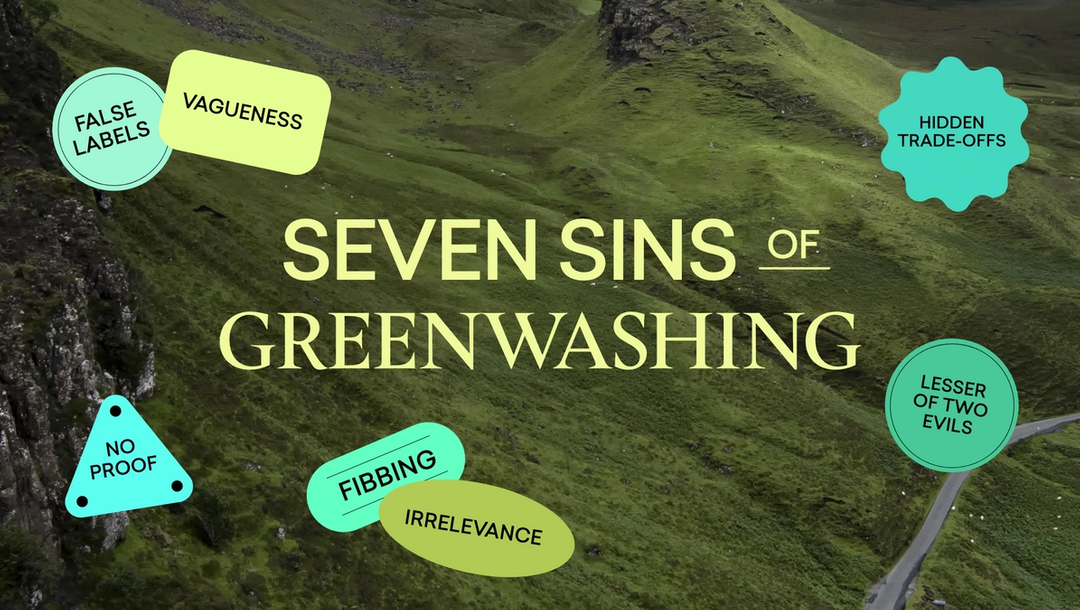The 7 Sins of Greenwashing And How To Avoid Them

March 4, 2021
3/4/2021
Written by: Allie Willison, Customer Experience @blueland
Nearly 70% of consumers in the U.S and Canada agree that sustainable and eco-friendly practices are important factors when deciding whether or not to support a brand. With more demand from millennials and Gen Z especially, thousands of “green” products have flooded the market. But how does one tell if a product is as green as it claims to be?
This can be hard due to the practice of greenwashing. To help you, we’ll discuss the following:
- The definition of greenwashing
- The 7 Sins of greenwashing
- How Blueland has avoided greenwashing
What Is Greenwashing?
Greenwashing is the practice of making unwarranted or overblown claims of sustainability or environmental friendliness in an attempt to gain market share. Though coined in the 1980s, the term has been used more and more in the past few years as consumer tastes shift to more eco-friendly products.
In 2010 Terrachoice released a report on the sustainable market, which included the 7 most common tricks used to distract and deflect consumers when it comes to environmentally sound products. They called them the 7 sins of greenwashing.
What Are the 7 Sins Of Greenwashing?
- Sin of the Hidden Trade Off
This is when companies suggest a product is “green” while other aspects of the product or practice are not eco-friendly.
An example of this is organic farming. That while it has its environmental positives, it also requires more land and water than traditional agriculture. Though still up for debate, it’s hard to definitely say organic is better due to the trade off.
Another example of the hidden trade off is how many paper products that promote recycled content and sustainable harvesting practices don’t account for the impact of their manufacturing process. Paper products use a ton of water to produce, plus the waste from production ends up back in our soil and water.
- Sin of No Proof
An environmental claim that can’t be supported with definite proof or by a reliable third party certification.
Companies can claim time and time again that their product is eco friendly, but withhold details on their supply chain, ingredients, or manufacturing process. Without clear proof, their claim has no standing.
- Sin of Vagueness
Claims that are so broad and ill defined they’re bound to be misunderstood by consumers.
Companies will use words like “natural” or “chemical-free” to describe their products, but there is no meaning or accountability since there isn’t a certification attached. An example would be how many cosmetic companies claim their products are natural or “all-natural”, this just means that all or some of the ingredients are plant based instead of synthetic. Since it’s not officially regulated, it’s a subjective term dictated by the company itself and whatever they deem to be natural.
- Sin of Irrelevance
Environmental claims that are true but unhelpful and unimportant, ultimately distracting to the actual issue at hand.
For example, something may say it’s CFC-free, however, the ingredient is already banned by law and therefore has no relevance.
- Sin of Lesser of Two Evils
This is when a claim is true for the product, but distract from other worse health or environmental issues.
A famous automotive company once advertised “clean diesel” but diesel fuel still creates loads of carbon emissions. So there really can’t be a “clean” version of it.
- Sin of Fibbing
When claims are false.
Companies will often mislead instead of outright lie, since lying can lead to lawsuits which many major corporations have dealt with in the past years due to greenwashing.
- Sin of False Labels
Using fake third party labels as certifications on products to trick consumers into thinking the product is backed by a legitimate third party.
Be mindful of the labels “eco” products have plastered on them, if there isn’t a legit third party backing it, then it has no standing.
Keep Reading
Refill is the New Recycle
The perfect way to start cutting out single use plastic from your home.











